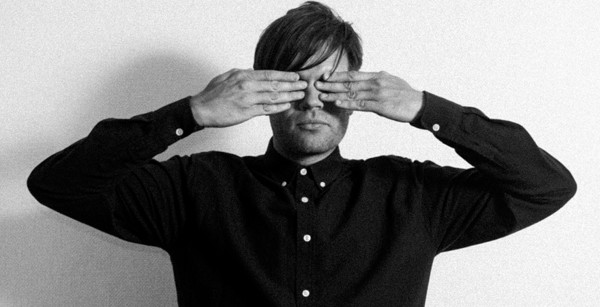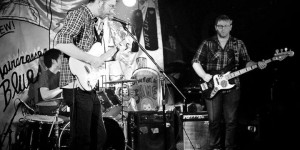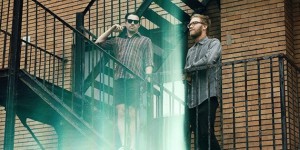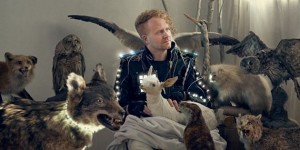 Music
Music
Trentemøller gets lost in love and music
by Jesse Ship
October 7, 2013
Photo: Alastair Philip Wiper
Anders Trentemøller is lost in love. His new album hopes to inspire the dreamers and the fanatics to lose themselves in passion, rather than the darker aspects the word brings to mind. It’s a fitting title for his often-melancholic yet uplifting sounds, especially on this album where he’s paired up with shoegazer friends like Kazu Makino of Blonde Redhead and Sune Rose Wagner of The Raveonettes. The indie-rocker turned electronic producer transformed again into a full-scale band to tour his show as a headliner at Coachella in 2011, and has recently finished a summer tour with Depeche Mode in Europe. We spoke with Anders about his love for analogue recording techniques, the mystery of the ø, and his opinion on the full album experience.
AUX: Is Trentemøller is a stage name or simply your last name?
Anders Trentemøller: It’s just my last name. It’s funny you asked because in the beginning, I was trying hard to find a cool English-sounding name, but it didn’t work, so I thought that maybe it’s easier to use my last name. And then there’s the special ø we have that only appears in Danish, and it’s quite fun visually, so we went with my name instead.
And you couldn’t just use the Ø on it’s own since that’s already taken too. You recently toured with Depeche Mode this summer for a few months. It seems like a good pairing. Did they influence your music at all?
When I was a teen I grew up with them. I feel they wrote some of the best ‘80s and ‘90s pop songs in that area, so it was quite huge to be asked by them to play the same stages in front of a lot of people. Hanging out and having beers with guys like Martin Gore and the rest of the band was pretty weird.
Did they talk about your music?
Yeah, the most emphatic thing was that Martin Gore told me he was a big fan. That was big for me. Gore told me he had all my records and knew my mixes even, so that was a huge thing for me too.
What does the album title, Lost, mean to you?
Lost was a word that kept on popping up when I was working on this album, writing stuff and trying to find out what the album should sound like. I really didn’t pay any attention to it in the beginning, but the word lost can also have a double meaning. It’s a negative thing, like being lost and can’t find your way, but for me, lost can also be a positive thing, like being lost in love, or lost in music. The thing about being lost in time and space, and forgetting about your daily routine, and just being in the now, that is exactly what happens when I make or listen to music. I thought it was quite interesting to use a word that has those two different meanings. It was also a nice short sentence compared to my other album titles, haha.
There’s a fair bit of analogue production on Lost.
I’m using digital stuff to make my music but also a lot of analogue equipment. One of the things I used the most was an old tape machine that nearly every instrument has gone through. It has a dusty, dirty old sound and it somehow glues every sound together. That really suits my music because there are still some elements of electronic, as well as indie, hard or even surf rock in my music. To use those different styles and then give it a warm analogue sound was exactly what I was looking for. The tape machine really defined most of the album.
Are bands recording on tape in Denmark as well? It’s become a bit of a throwback trend over here.
Yeah, I think because in the late ‘90s and in the last 10 years, a lot of bands recorded digitally because it was cheaper and people wanted something clean sounding. For me personally, it’s not because it’s some kind of trend, but many of my favourite albums from The Cure, The Smiths, and older bands like Velvet Underground were recorded on tape. It’s a special sound, something that I’ve always loved. I really felt that with all the digital stuff and plugins and software, they can’t give the same warm sounds. Tape is definitely the way to go for me, also in the future, but fused with the computer of course.
Is there an intentional arc in the album? Some of the early tracks like “Gravity” (featuring Jana Hunter of Lower Dens) are very uplifting, but it gets very dark towards the end.
I thought that the order of the songs was very important because I love the album format. A lot of people may hear a song first on iTunes, then on a blog, and then another on Spotify maybe. People are picking up single tracks many different places, but I still like the idea of putting on an album and listening to it from start to finish. I also think that you get a much deeper insight into your favourite artist if you’re listening to an album how it was intended to be. I also will pick up a track here and there but the whole idea of an album format is something that I really like, and also why I think vinyl has become even more popular again. People can sit with the physical cover, read the notes, and have something in their hands, not just an MP3 on the computer. But also, after like 30 minutes, you really have to get off your ass to flip the record. Those things make you a little more aware of the music, not just using music as a consumer thing that just goes in the background all he time.
There are a number of guest vocalists on the album, like Jonny Pierce of The Drums, Kazu Makino of Blonde Redhead, and Sune Rose Wagner of The Raveonettes. How did you know they were right for the songs?
That was quite easy because when I was in the writing process, I started to write tunes with these vocalists in mind. I was writing for them without them knowing it, so to speak. I had to cross my fingers during the writing process. It was only towards the end of the writing process that I asked them if they’d like to work for me. Luckily they all said yes. If some had said no, then I don’t think it would have worked with anyone else. I knew what these people were capable of because they are my big heroes and idols. I know all their back catalogs. It was an opposite way of working.
What was the influence for the song “Constantinople”?
The funny thing is that I thought this track had not just a Turkish, but an Eastern thing, going on with a box organ. It had a lot of inspiration from The Doors, and the way the organ sounds on The Doors albums. It was actually an excuse for me to write a long organ solo. Because I thought it had this Eastern melody to it, the name “Constantinople” made sense, as it is the old name for Istanbul. I thought that sounded exotic and really fit the track well.
Are there any other different instruments on the album?
Yes, I was using a thing called a celesta. It’s a big glockenspiel keyboard thing from the 1800s. It has a really special sound of bells playing. I also used a violin that I put through some guitar amps, got it back on tape, then got it back into my kitchen and re-amped and recorded it through different microphones. When you’re listening to that sound on the album, it sounds more like a guitar or a synth. I also like to use common instruments but manipulate their sounds so its something you can recognize but hard to point out.
Will there be any remixes coming from you in the future?
Not really. I’ve had to say no to a lot of remixes lately to focus on my own music. They take up a lot of time, so I would definitely rather work on my albums and playing live and then sometimes doing one here or there.

This article originally appeared in the October 2013 Issue of AUX Magazine.
Download and subscribe for free in the app store.
Tags: Music, Interviews, AUX Magazine October 2013





